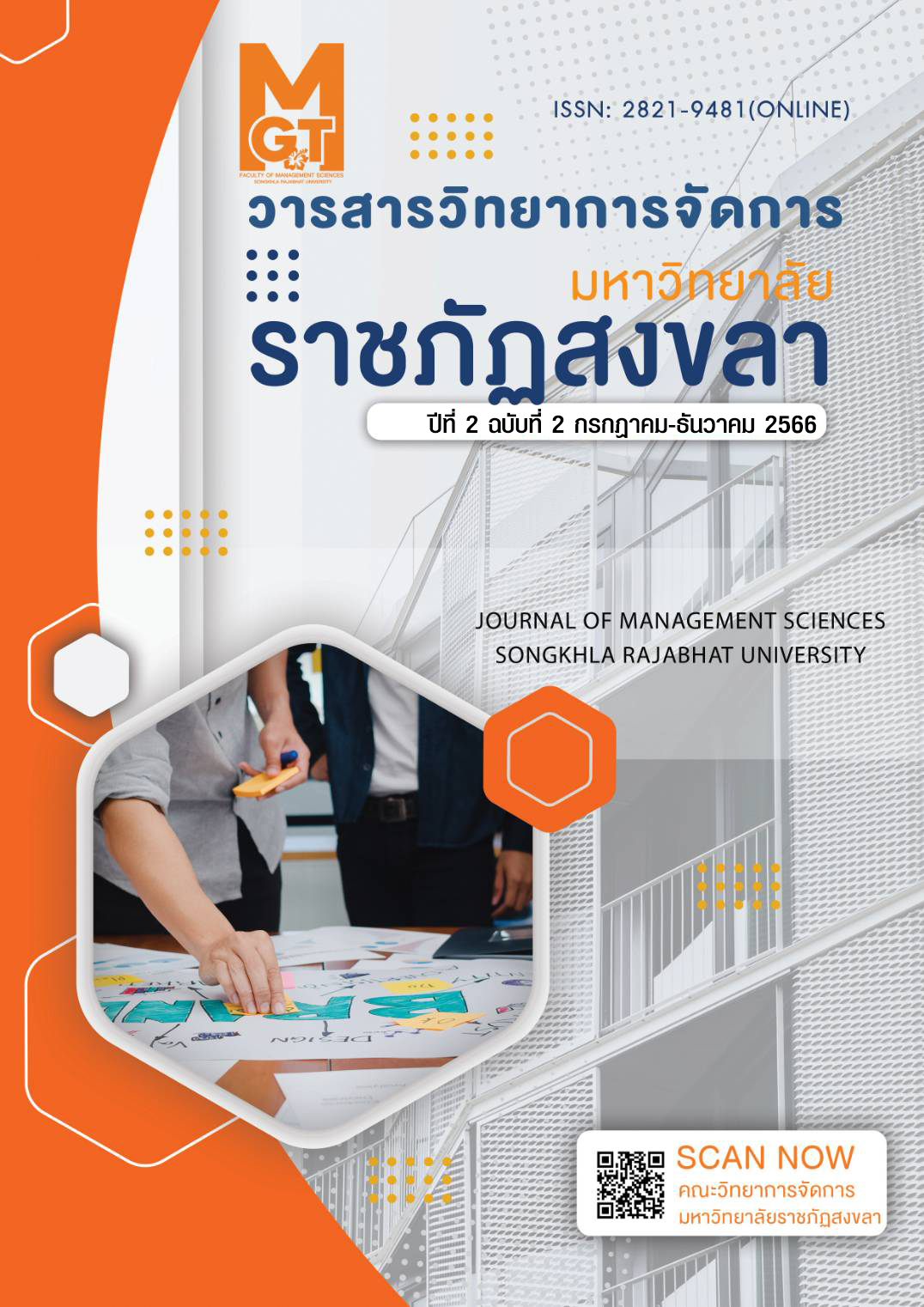Guidelines for developing the competitiveness of the Thai Halal restaurant business
Main Article Content
Abstract
The objectives of this research were 1) to study the business environment of the Thai Halal restaurant business and 2) to determine the guidelines for developing the competitiveness of the Thai Halal restaurant business. It is a mixed method which consists of qualitative research to collect data from structured interviews with 15 Thai Halal food business entrepreneurs and experts using purposive sampling. And analyzing the data using content analysis and quantitative research that data was collected using questionnaires from 400 Thai Halal food business entrepreneurs by purposive sampling and data analysis using descriptive statistics. The results showed that 1) the business environment of the Thai Halal restaurant business in terms of the environment of the Thai Halal restaurant industry in Thailand, the government policy was to promote agricultural products and products with Halal standards. The Thai Halal restaurant business will benefit from government policies that focus on stimulating consumer spending in the country. Consumers still misunderstand the meaning of Halal food and entrepreneurs use technology to create efficiency and apply it to more restaurant management. The competition in the Thai Halal restaurant industry found that the number of new competitors is relatively small. Rivalry Among Existing Firms is low. The bargaining power of suppliers is low too, due to the increasing number of businesses dealing with Halal-certified food. Buyers have high bargaining power. Including the availability of many substitute products and 2) guidelines for developing the competitiveness of the Thai Halal restaurant business, consisting of developing the personal characteristics of entrepreneurs developing business management abilities Both in terms of production, marketing, finance, and preparation for applying for Halal certification.
Article Details
References
Ali, B. J., & Anwar, G. (2021). Porter’s Generic Competitive Strategies and its influence on the Competitive Advantage. Ali, BJ, & Anwar, G.(2021). Porter’s Generic Competitive Strategies and its influence on the Competitive Advantage. International Journal of Advanced Engineering, Management and Science, 7(6), 42-51.
Ajitabh, A., & Momaya, K. (2004). Competitiveness of firms: review of theory, frameworks and models. Singapore management review, 26(1), 45-61.
Aree, S., Kimsuksri J., Dahlan, W., Aree, M., & usman, P. (2013). Halal Food Business Opportunities and Approach to Access Indonesian Market. Bangkok: Muslim Studies Center Chulalongkorn University.
Banmonta, C. (2020). Value Adding Strategy in Halal Food. Journal of Industrial Business Administration. 2(1), 21-34.
Cochran, W.G. (1953). Sampling Techniques. New York : John Wiley & Sons.
Daengs, G. S., Istanti, E., Negoro, R. M., & Sanusi, R. (2020). The aftermath of management actions on competitive advantage through process attributes at food and beverage industries export import in Perak Harbor of Surabaya. International Journal of Criminology and Sociology, 9, 1418-1425.
De Chernatony, L., Harris, F., & Riley, F. D. O. (2000). Added value: its nature, roles and sustainability. European Journal of marketing. 34(1/2), 39-56.
Export-Import Bank of Thailand. (2021). Penetrating the Halal food market Amidst the COVID-19 outbreak. Bangkok: Export-Import Bank of Thailand.
Flanagan, R., Jewell, C., Ericsson, S., & Henricsson, P. (2005). Measuring competitiveness in selected countries. UK: The University of Reading.
Hair, Jr. J. F., Matthews, L. M., Matthews, R. L., & Sarstedt, M. (2017). PLS-SEM or CB-SEM: updated guidelines on which method to use. International Journal of Multivariate Data Analysis, 1(2), 107-123.
Hayati, N., Jaelani, E., Sopian, D., & Dewi, I. P. (2021). Analysis of Competitive Strategy to Create Sustainable Competitive Advantages Seen From the Nine Factor Model and Bacos Treacy Model. Journal of Physics: Conference Series, 1764(1), 012053.
Kaewnui, N. (2019). Restaurant management under certified Halal food standard in three southern border provinces of Thailand. (Doctor of Philosophy Dissertation). Bangkok: Siam University.
Kamonnarakit, J., Warunsukasiri, R., & Pooripakdee, S. (2017, July). The Guidelines for Developing Thai Tourist Halal-Food Restaurants in Hadyai District, Songkhla Province. In 3rd TECHCON 2017, Siam Technology College, Bangkok, Thailand.
Kotler, P., & Keller, K. (2021). Marketing Management (15th global edition). Pearson Education Limited.
Momaya, K., & Selby, K. (1998). International competitiveness of the Canadian construction industry: a comparison with Japan and the United States. Canadian journal of civil engineering, 25(4), 640-652.
Murtha, T. P., & Lenway, S. A. (1994). Country capabilities and the strategic state: How national political institutions affect multinational corporations' strategies. Strategic management journal, 15(S2), 113-129.
Nilson, T. H. (1992). Value-added marketing: marketing management for superior results. New York: McGraw-Hill Book Company.
Saengsri, N. (2023). Halal Business System: Food, Logistic, Tourism and Finance. Journal of Srinakharinwirot Research and Development (Journal of Humanities and Social Sciences), 15(29), 1-13.
Sanchez-Gutierrez, J., Gutierrez-Govea, A., Gaytan-Cortes, J., & Garcia Jimenez, E. (2011). Corporate social responsibility and competitiveness in the restaurant industry in Guadalajara. In Competition Forum. 9(1), 137-143.
Singtanasarn P. (2019). Increasing the competitiveness of the canned food export business and dried food export business in Thailand using the resource-based theory. Journal of Economics and Management Strategy. 6(1), 103-120.
The Halal Standard Institute of Thailand. (2016). The certify of Halal restaurants owned by Muslim entrepreneurs to Halal certification for increased value and popularity through the Halal Thailand Mark Project. Bangkok: The Halal Standard Institute of Thailand.
The National Statistical Office. (2018). The survey on conditions of society, and culture and mental health (Thai Happiness). Bangkok: The National Statistical Office. (In Thai)
Tourism Authority of Thailand. (2017). Summary of tourist situations. In the travel brochure. Bangkok: Tourism Authority of Thailand.
Yakubu, B. N., Salamzadeh, A., Bouzari, P., Ebrahimi, P., & Fekete-Farkas, M. (2022). Identifying the key factors of sustainable entrepreneurship in the Nigerian food industry: The role of media availability. Entrepreneurial Business & Economics Review, 10(2). 148-162.


